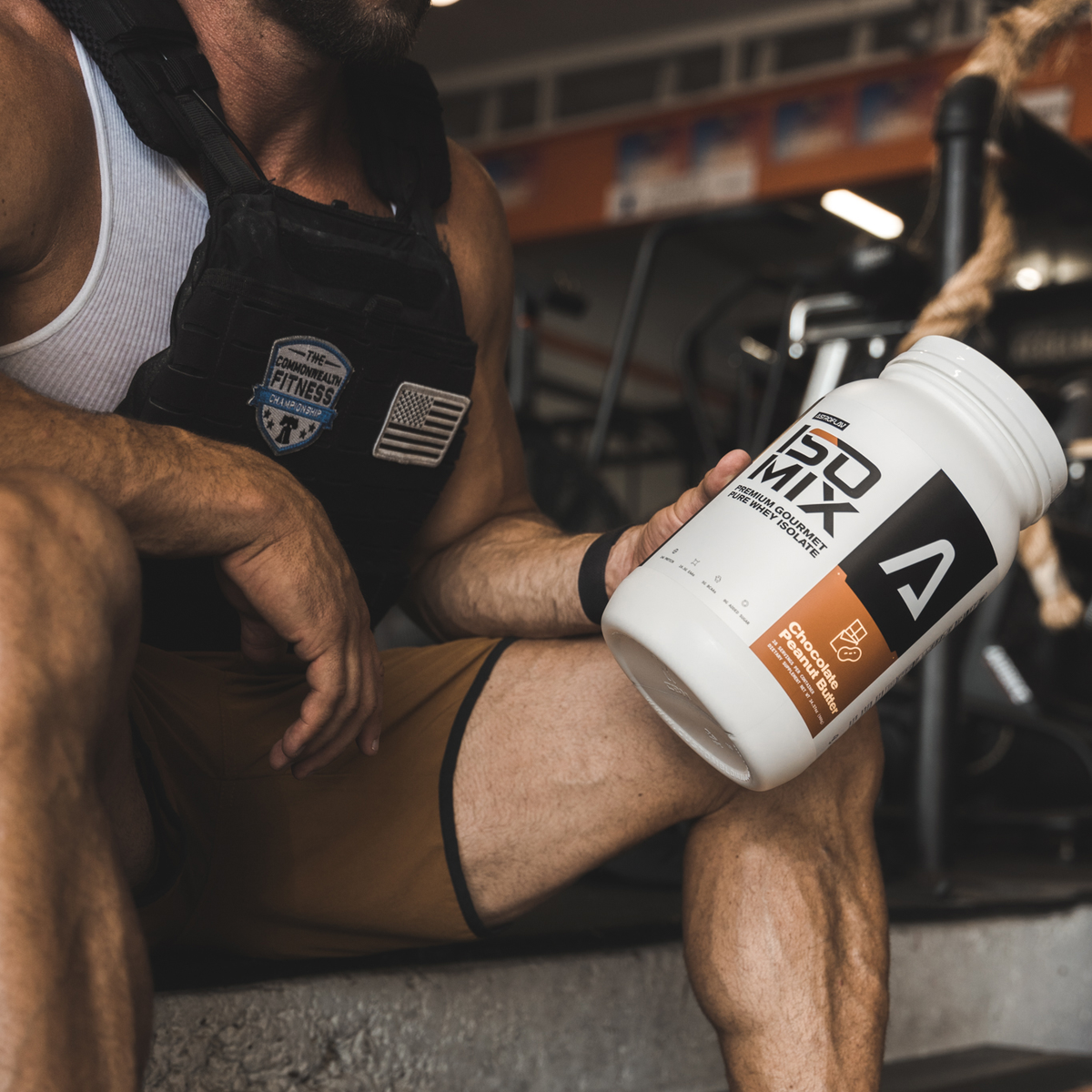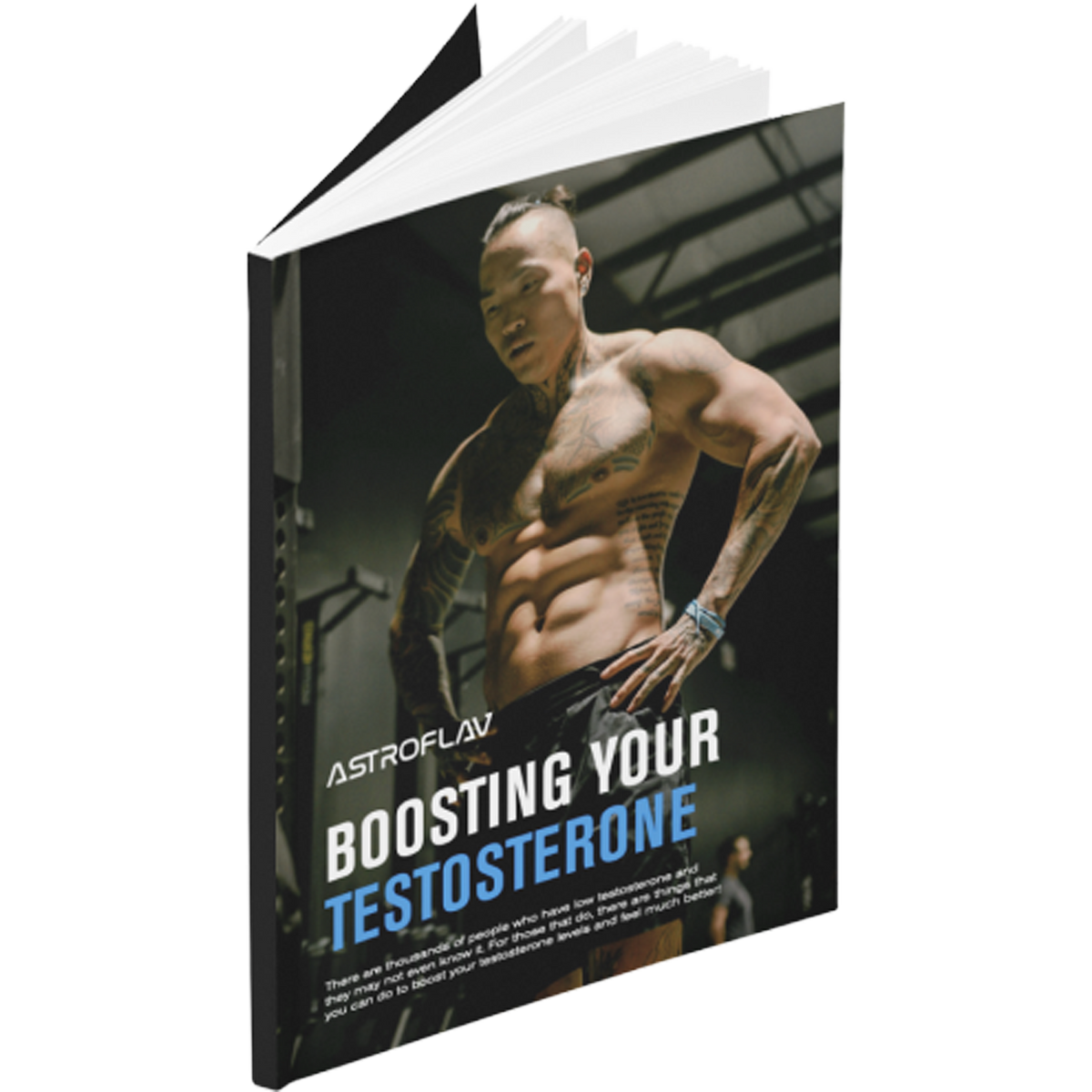
How Much Protein Do You Need to Build Muscle?
Did you know that there are many ways to increase your protein intake other than consuming an absurd amount of chicken and/or beef? Consuming enough protein is not only essential for building muscle, but also for muscle recovery.
Protein is one of the most important macronutrients for building muscle; therefore, it is important to make sure you are getting enough clean and complete protein sources.
So how much protein do you actually need to build muscle and what are easy ways to increase your daily protein intake? Good news! Today's article goes over everything you need to know about protein, how much you need, and the best protein sources to seek out when looking to increase your protein.
What is Protein?
Protein is an essential macronutrient that your body needs to grow and repair tissue and muscle cells. Proteins are found in every area of the body including our bones, organs, hair, skin, and nails.
Protein contains essential and non-essential amino acids (the building blocks for all our proteins in the body). Essential amino acids are ones that our body cannot make on its' own; therefore, these amino acids must come from the food we eat.
Complete proteins are essential for building muscle as they contain all of the essential amino acids that the body needs to grow and repair itself. These proteins mainly come from animal-based sources like meat, fish, eggs, poultry, and cheese. Whey protein powder is another complete protein source; however, finding one that has clean ingredients and manufactured appropriately is ideal.
In order to build muscle, it's important to make sure you are eating complete protein sources. Without having these complete proteins, it will be a lot more difficult for you to grow muscle efficiently.
Recommended Protein Intake to Build Muscle:
As a general recommendation, 10-35% of your daily energy intake comes from protein. So, say if you consume 2,000 calories per day, you would be eating roughly 200-700 calories from protein (carbs and fat make up the rest of the calories).
Addidionally, protein recommendations can be based of a person's body weight and BMI. According to the Academy of Nutrition and Dietetics, the average individual should consume 0.8 grams of protein per kilogram. So if an individual weighs 65kg, they should consume at least 52 grams of protein.
Now, this is just a general recommendation for those looking to find how much protein they should aim for. However, if you're actively working out and looking to build muscle mass, this number will be much higher.
According to a study done on protein intake for bodybuilders, "Dietary protein intake is recommended to be 1.6–2.2 g/kg/day with a focus on sufficient protein at each meal (0.40–0.55 g/kg/meal) and an even distribution throughout the day (3–6 meals)." (Iraki, 2019).
A good rule of thumb to start at would be to take 1 gram of protein per pound of your GOAL bodyweight. So, if my goal was to be 135lbs, a good protein goal to start would be no less than 135 grams per day.
When Should I Consume Protein?
So, when is the best time to consume protein? Although your protein intake will be considered throughout the entire day, one of the best times to get in protein is immediately after your workout. Especially if you're looking to build muscle, a post-workout shake or a meal high in protein will be ideal.
Interestingly enough, the process of protein turnover is increase with resistance training and can remain elevated for up to 48 hours. Additionally, research suggest there are several benefits to ingesting protein after exercise on skeletal muscle hypertrophy (ACSM, n.d). Lack of protein after exercise may result in limited muscle growth and any potential progress in lean muscle tissue development.
Ever heard of an "anabolic window?" This window of time is essentially within an hour of exercise has the greatest influence on resistance training adaptations. So, if you or you know of someone that slams a protein shake right after their lift, this may not be such a bad idea.
How much protein do you need post-workout? According to the American College of Sports Medicine, the recommended amount that athletes should have after their workout is a minimum of .11g to .14g per pound of body weight. It is also advised to consume a complete protein source no longer than 2 hours after your workout to help increase muscle growth (ACSM, n.d).
A good rule of thumb would be to aim for a post-workout meal or shake that has at least 30 grams of protein. This will ensure you are getting adequate amount of protein post-workout as well as enough amino acids to start building muscle.
What are Good Protein Sources To Help Build Muscle?
Whether you're wanting to bulk up and put more muscle mass on or simply increase lean muscle mass, complete protein is the kind of protein to consume. Foods such as chicken breasts, lean ground turkey/beef, fish, eggs, and dairy products are all great sources of complete proteins. You can also supplement with whey protein powder as this type of protein also contains all 9 essential amino acids for building muscle.
Whey protein is beneficial in supporting muscle adaptations due to its rapid absorption rate. Like mentioned previously, whey protein contains all essential amino acids which are beneficial to muscle growth and recovery from exercise. These amino acids also help replace muscle glycogen and delaying fatigue by supplying essential aminos and electrolytes to the muscles.
We understand that eating this much protein can be difficult at times. Sometimes those extra few ounces of chicken may not be appealing, but we know are definitely necessary to hit the daily protein goal and contribute to muscle growth. This is where having a high-quality protein shake comes in handy.
If you're looking for a protein powder with clean ingredients and considered a "complete protein," AstroFlav's IsoMix will be perfect for you! Our whey protein isolate, IsoMix, is a blend of high-quality ingredients and contains all 9 essential amino acids — making it the perfect complete protein supplement to add to your diet!
If you are vegan or plant-based, protein might be a hard macronutrient to make sure you're getting enough of. Finding the right plant-based protein powder, rich in all essential amino acids is also a great option. Our VeganMix, a plant-based protein powder is comprised of all 9 essential amino acids, including BCAAs and great for building muscle!



Tips for Getting in More Protein:
A high protein diet can be made easy with small changes to your diet. Adding in additional amounts of protein to each meal is an easy way to increase your protein as well as swapping extra carbs for more protein. Below is a list of easy ways to eat more protein:
Increase amount of protein per meal - Add in an extra ounce of few extra grams of chicken or meat to your meal.
Replace sugary carbs for high protein foods - Swap the cereal with a couple of eggs.
Snack on high protein foods - Cheese, jerky, Greek yogurt, and protein bars are all great high-protein snacks.
Opt for Greek yogurt - Greek yogurt contains additional protein opposed to regular yogurt. Swap the Yoplait with Oikos Greek yogurt!
Add nuts and nut butters to your diet - Nuts provide a good amount of plant based protein. Top your yogurt with crushed almonds or dip your apples in peanut butter!
Add a protein shake into your day - Can be a big shake for a meal replacer or a small shake for a snack. This will help increase your protein by over 30 grams!

The Bottom Line:
Protein is an essential macronutrient to every healthy diet. It is the foundation of building muscle and contributes to many other benefits to your overall health. Ensuring you have enough protein in your diet is highly necessary for building muscle mass.
A diet based on current protein intake recommendations (.8 grams per each kg of bodyweight), may not be enough if you're goals are to put on more muscle mass... fast. Upping your protein intake to around 1-2 grams per body weight in pounds (lbs) is ideal for accelerated muscle growth and recovery.
You can find complete protein in food sources like fish, eggs, lean meats, dairy, and whey protein powders. Daily protein intake can also be achieved through high-quality, plant-based protein powders. AstroFlav's VeganMix is a great plant-based protein powder that contains all essential 9 amino acids to support muscle recovery.
Not to mention our whey protein powder, IsoMix, is also a complete protein and comes in many delicious flavors like Cookies & Cream and Chocolate Peanut Butter! Click the link below to try yours today!
ASTROFLAV ISOMIX
IsoMix's™ whey protein isolate comes in amazing flavors that will satisfy your inner child while helping you stay healthy without all the guilt!
Easy mixing in less than 60 seconds!
Out Of This World Flavor!
Minimal sugar & carbs!
An ideal protein for any low-carb diet!
PLUS...
Gives Your Body More Nutrition In Less Time Than It Takes To Order A Cup Of Coffee
Makes It Easy To Achieve All Your Goals Whether It's Losing, Maintaining, Or Gaining
Avoid The Cravings You Get For Unhealthy Treats
How To Make Progress Faster By Fueling Your Body With The Best Tasting Nutrition Available
You can use IsoMix to ignite your childhood nostalgia at any time of day. It’s a fantastic way to fuel your body, giving you the satisfaction & nutrition you deserve.
How To Use
Quick and easy two step mixing!
Pour 8-10 oz of your preferred beverage.
Add 1 serving of IsoMix to your shaker cup. (Mixes great even with a spoon)
ASTROFLAV ISOMIX
IsoMix's™ whey protein isolate comes in amazing flavors that will satisfy your inner child while helping you stay healthy without all the guilt!
Easy mixing in less than 60 seconds!
Out Of This World Flavor!
Minimal sugar & carbs!
An ideal protein for any low-carb diet!
PLUS...
Gives Your Body More Nutrition In Less Time Than It Takes To Order A Cup Of Coffee
Makes It Easy To Achieve All Your Goals Whether It's Losing, Maintaining, Or Gaining
Avoid The Cravings You Get For Unhealthy Treats
How To Make Progress Faster By Fueling Your Body With The Best Tasting Nutrition Available
You can use IsoMix to ignite your childhood nostalgia at any time of day. It’s a fantastic way to fuel your body, giving you the satisfaction & nutrition you deserve.
How To Use
Quick and easy two step mixing!
Pour 8-10 oz of your preferred beverage.
Add 1 serving of IsoMix to your shaker cup. (Mixes great even with a spoon)
RESOURCES
Iraki, J., Fitschen, P., Espinar, S., & Helms, E. (2019). Nutrition Recommendations for Bodybuilders in the Off-Season: A Narrative Review. Sports (Basel, Switzerland), 7(7), 154. https://doi.org/10.3390/sports7070154
Protein intake for optimal muscle maintenance - ACSM. (n.d.-a). https://www.acsm.org/docs/default-source/files-for-resource-library/protein-intake-for-optimal-muscle-maintenance.pdf?sfvrsn=688d8896_2




